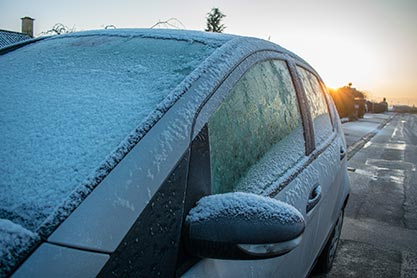
As we begin to experience the frosts of the early mornings and the below freezing temperatures result in water transforming into a glaze of ice over the glass windows of your vehicle, we thought now may be a great time to remind you of the famous do’s and don’ts of de-icing your car.
We all know how much of a disappointment it can be to leave your home in the morning whilst in a rush, only to find that each window of your vehicle is covered end-to-end in a thick sheet of ice. There are preventative measures which you can take to lessen the effect of ice setting on your glass each morning, such as covering your windshield up with a weighted towel or sheet to prevent a build-up. Also, if you have a garage – use it! Tucking your vehicle away at night will protect it from the elements outside, keeping it roasty and toasty and ready for your morning commute.
However, without taking these measures, there will undoubtably be a sheet of ice covering your vehicle when you step outside come morning time. Here are our list of do’s and don’ts when it comes to safely and correctly de-icing.
DO examine your exhaust pipe
When approaching your vehicle, take a moment to examine the exhaust pipe. A build-up of ice or snow can prevent carbon monoxide escaping the car, and result in it filling the space occupied by the driver and passengers. So be sure to remove any traces of this before switching your engine on.
DO let your vehicle warm up
Many vehicles nowadays have a windscreen de-frost setting, allowing you to sit inside your vehicle with the engine running, staying as warm as possible and warming up the car internally whilst the heated strips through your windscreen get to work to break down the ice.
DO use an official ice scraper
Many drivers often utilise anything that they have on them in the moment to remove the layers of ice from their vehicle, from credit cards and keyrings to CD cases. Both of these risk damage of breakage to themselves and the glass of your windows, resulting in a costly repair or replacement. Made-for-purpose ice scrapers are produced to withstand the force that ice can bear, so with a few short and sharp strokes, you can remove all traces of the ice, allowing your windows to become clear in just a few moments.
DO keep a can of de-icer in your vehicle
If the ice on your windshield appears to be thick, save yourself some time with the ice-scraper and spray a thin sheet of de-icer over all windows of your vehicle. Available for just a couple of pounds at any petrol garage or supermarket, the spray solution works to break down the ice, reducing the amount of time and effort needed to clear the ice completely.
DON’T rush the defrosting process
It should be expected that your vehicle may take around 10-15 minutes to fully defrost, so don’t try to rush the process as this could cause damage to your vehicle or unsafe driving.
DON’T use warm or hot water
It is surprisingly common to see drivers ‘defrosting’ their widows with a bucket of hot water. This is a definite no-go situation. When the temperature of glass dramatically and instantly changes, it has the tendency to crack or smash due to a process called thermal shock. It may seem like a shortcut, but a broken windshield will only halt your journey further and result in a costly replacement!
DON’T partially clear your windows
If you are in a rush, you may find it tempting to clear only a part of your windscreen before heading off on the road. However, as well as this being incredibly unsafe driving and risking causing harm to another driver or pedestrian, this can in fact cost you a fine and three points on your licence. It is a legal requirement to clear all windows before releasing your handbrake and setting off on the road.
If you require any further information on how best to de-ice your vehicles this winter, or if you suspect some damage has occurred upon yours which may need a repair or replacement, do not hesitate to get in touch with us here at Bromley Vehicle Test Centre where we will be happy to offer you the assistance that you require. Give us a call on 020 8460 6666 today.
